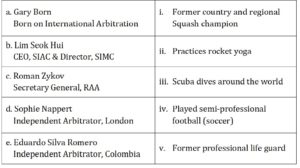The New Year is upon us. You have a major submission that is now due and a hearing about to start in another case. How did that happen? Not to worry! To help you keep procrastinating, the Kluwer New Year’s International Arbitration Quiz is here to help.
As in years past, the first reader to submit the correct answers, or the first submission with the most correct answers, will win a dinner in Florence (not including travel or hotel) at your convenience and a free subscription to Kluwer Arbitration Blog for 12 months. Please send your answers to kluwerarbitrationblog@outlook.com by 6 January 2019.
Answers will be published next week.
1. Which current prime minister of a European country had to resign from commercial arbitration appointments upon being named head of state?
a. Lars Løkke Rasmussen, Denmark
b. Giuseppe Conte, Italy
c. Dimitri Medvedev, Russia
d. Juha Sipilä, Finland
e. Emmanuel Macron, France
2. The “Singapore Convention” for the enforcement of mediated settlements was introduced at the 2014 UNCITRAL Working Group II session by which country?
a. Singapore
b. The United States of America
c. Ecuador
d. Australia
e. The Netherlands
3. Which set of arbitral rules incorporates a code of conduct for arbitrators, with the possibility of removal from pending proceedings and/or being stricken from future appointments for failing to adhere?
a. Milan Chamber of Arbitration (CAM)
b. International Centre for Dispute Resolution (ICDR)
c. Hong Kong International Arbitration Centre (HKIAC)
d. International Court of Arbitration of the International Chamber of Commerce (ICC)
e. North Antarctic Arbitration Court of McMurdo Sound (COLD)
4. Know your arbitrator! Match the following:
5. According to standardized data reported in 2018 by the ICC, LCIA, SIAC, HKIAC, and the ICDR, the average time to appoint a three-arbitrator tribunal in 2017 was:
a. 12 days
b. 23 days
c. 47 days
d. 81 days
e. Hah! There is no such data
6. In Rethinking Choice of Law (Eleven Publishing Int’l 2018), Gustavo Moser reviews a substantial body of empirical data that suggests the principle reason parties who choose to exclude the application of the UN Convention on the International Sale of Goods (CISG) from their contract choice of law provisions, do so because of:
a. Strategic preferences for a particular law that they do not wish the CISG to displace.
b. Ignorance of the CISG.
c. The two-year statute of limitations for liability for latent defects under Art. 39 of the CISG.
d. A perception that the CISG favors parties from common law countries, leading them to prefer instead the Prague Law on the Sale of Goods.
7. The ICCA/Queen Mary report on Third Party Funding in International Arbitration (2018) made which recommendation with respect to disclosure of funding agreements when determining requests for security for costs?
a. Arbitral tribunals should not require disclosure of the funding agreement, only the identity of the funder, because of the privileged and confidential nature of the agreement.
b. A tribunal may require disclosure of the third-party funding agreement in order to assess whether the funded party is impecunious, which is necessary to determine whether security for costs is warranted.
c. A tribunal may require the funder to disclose the funding agreement to determine whether the funder has agreed to pay an adverse costs award, not to determine whether the funded party is impecunious.
8. Participants in the Global Pound Conference ranked in-house counsel as having the greatest ability to influence the future of commercial dispute resolution. According to the data, which of the voting stakeholder groups shared this view the least?
a. Arbitrators, mediators, judges
b. External counsel
c. Government representatives (ministries of justice)
d. Academics
e. In-house counsel
9. “Happy Fun Time” refers to:
a. When parties settle their dispute and the arbitration institution refunds a substantial portion of the fees they advanced.
b. How arbitral tribunals refer to their Procedural Order n. 23.
c. The lighthearted discussion at the end of each episode of The Arbitration Station podcast.
d. Art. 11.8.4.2.76.3 of the IBA Guidelines of Conflicts of Interest, “the Yellow List”, which provides that arbitrators need not disclose more than three drinks with a party so long as the arbitrator paid for them.
10. Which of the following celebrities was not involved in a highly-publicized dispute over the initiation (or not) of an arbitration in 2018?
a. Stormy Daniels
b. Jay-Z
c. Donald Trump
d. Brad Pitt
11. Which of the following institutions offers ODR (online dispute resolution) for manufacturing disputes on the basis of documents only, and in which the arbitrators are engineers?
a. ICC Mediation and ADR Services
b. Hong Kong International Arbitration Centre (HKIAC)
c. Court of Arbitration of the Stockholm Chamber of Commerce (SCC)
d. Court of Innovative Arbitration (COIA)
e. International Centre for Dispute Resolution (ICDR)
12. Extra points. Write the conclusion of a joke that begins with the line below. We will publish our favorite response with the Answers to the Quiz.
An arbitrator, a law firm partner, and an in-house counsel walk into a bar together……………
________________________
To make sure you do not miss out on regular updates from the Kluwer Arbitration Blog, please subscribe here. To submit a proposal for a blog post, please consult our Editorial Guidelines.




I have had dinner in Florence with Michael.
It is a worthwhile experience!
Good luck on the quiz.
Procrastination is a much misunderstood and underrated skill. Thank you for the encouragement! I haven’t got around to completing the quiz but maybe we could have dinner in Florence anyway?